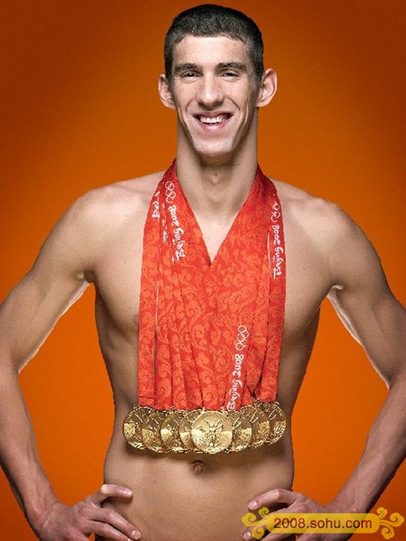
Michael Phelps is the most decorated Olympian in he modern incarnation of the Olympic Games. But is he the “greatest Olympian” ever? It’s partly a question of definitions, but I would argue that he is not.
If the measure is simply the number of Olympic victories, then Phelps is the greatest Olympian. He has an awe-inspiring 22 medals, 18 of them gold. And he could probably score another few medals in 2016 if he wanted. The problem, of course, is that we’re not comparing players within a single sport. When it comes to comparing across sports, here are some criteria to bear in mind:
1. How many medals are awarded in your sport — and how many times did you dominate the Olympic Games in your sport?
In swimming, 34 gold medals are awarded at every Olympic Games. Thirty-four. That’s compared to 14 in gymnastics (8 for men, 6 for women), 13 in boxing, 11 in rowing, 8 in diving and Taekwondo, 5 in badminton, 4 in archery and table tennis, 2 in basketball, soccer, volleyball, beach volleyball, handball, field hockey, triathlon. The only event that exceeds swimming in the total number of medals — indeed, the only event that comes close — is Track and Field, where there are 47 gold medals awarded. But “track and field” does not describe an activity so much as it does an arena. The variety of events in Track and Field is far greater, ranging from the 100m sprint to the marathon, from the hurdles to the steeple chase, and on to the javelin and shot put and high jump, speed walking and the women’s heptathlon and men’s decathlon.
A better measure, in my view, is how many Olympic Games you have dominated in your sport. Michael Jordan was arguably the most dominant athlete in any sport in 1992, when he competed alongside the Dream Team. But there’s only a single gold medal to be won in men’s basketball. Jordan is a two-time Olympic gold medalist, one-ninth of Phelps’ total. But he would have to compete in 18 Olympic Games in order to have as much opportunity for golds, and 22 Olympic Games — over the course of 84 years — in order to have the capacity to match Phelps’ total medal count.
2. How many medals can a dominant athlete in this sport potentially win in a single Olympic Games? AND how long many Olympic Games are available to dominant athletes in the sport?
Since the four strokes in swimming do not require dramatically different skills and physiques and muscle groups, it’s possible for one swimmer to excel in more than one stroke, and over a couple distances. Perfecting your technique in any individual stroke will take an incredible amount of time. But if you become one of the best in the world at a single stroke, you will already have the build, the physique, the endurance and most of the musculature to excel in the other strokes as well. Also, the window of opportunity for swimmers is open for a long time — where it’s exceedingly rare for an elite gymnast to truly excel at more than a single Olympics, for instance, it’s not uncommon for swimmers (or divers, or beach volleyball players, or etc.) to compete for medals in two, three Olympics games or even more. If Phelps wished, he could probably return for a fourth Olympics in Rio de Janeiro in 2016.
Let’s look at Phelps’ Olympic medals in 2004, 2008 and 2012:
100m butterfly – 3 golds
200m butterfly – 2 golds, 1 silver
200m freestyle – 1 gold, 1 bronze
200m individual medley (IM) – 3 golds
400m IM – 2 golds
4×100 freestyle relay – 2 golds, 1 silver
4x200m freestyle relay – 3 golds
4×100 medley relay – 3 golds
The only stroke Phelps truly dominated from 2004-2012 was the butterfly. He was one of the best in the world at the freestyle, but “only” good enough to win it once, at one distance (200m). He was not the best sprinter in the freestyle at the 50m or 100m distances, but the same capacities and build and endurance that enabled him to dominate in the butterfly enabled him to excel too in the 200m freestyle. The rest of his medals came from the medleys, the relays, and the medley relays. By being dominant in a single stroke, world class in one other stroke, and good enough in the breaststroke and the backstroke, Phelps collected an unprecedented amount of hardware. To be clear: what Phelps accomplished is staggering. It’s truly awe-inspiring, and I don’t mean to detract from the enormity of his accomplishment. But it could only really be done in his sport.
The obvious comparison here is with Usain Bolt. Bolt is a sprinter, a specialist at the same distances: 100m and 200m. There is only one “stroke” in sprinting. There are no medleys, no medley relays, and no 4x200m relay. The most medals Bolt could reasonably achieve were three: the 100m, 200m and 4x100m relay. The nearest event, the closest parallel to another “stroke” in swimming, would be the long jump. But the sprint and the long jump have reached such a high degree of specialization that it’s exceedingly uncommon for an athlete to excel both in the sprint and the long jump — far less common than it is for a swimmer to excel in two strokes. Even so, no sprinter has won the 100m or 200m more than twice, and even if one includes the long jump, the number of medals available to a best-ever sprinter like Bolt is far less than the number available to a best-ever swimmer like Phelps.
Bolt dominated the sprinting events in 2008 and 2012, and he came away with 6 medals in sum, all of them gold. Phelps was the most dominant swimmer in the 2004 and 2008 games, and he came away from those with 16 medals, 14 of them gold. There are only 3 medals to be won for male sprinters on the track in the 100m and 200m distances. Bolt won all of them, twice. If you compete in the 100m and 200m distances in swimming, across all the strokes and relays and medleys and medley relays, there are: the freestyle 100m and 200m, the butterfly 100m and 200m, the backstroke 100m and 200m, the breaststroke 100m and 200m, the 200m IM, the 400m IM, the freestyle relay at 4×100 and 4×200, and the 4×100 medley relay — for a total of 13 medals up for grabs. Multiply that by three Olympics, and you have 39 medals available to those who swim the 100m and 200m distances and can maintain their peak condition for 8 years.
Phelps is an extraordinary athlete, and arguably the best swimmer of all time. But it’s worth noting that there is only a single sport in the Olympic Games — swimming — that really gives an athlete at the top of his sport the opportunity to win so many medals in a single Olympics, and then gives you a lifespan where you can multiple that number two, three or four times over.
Tune back in tomorrow for Part 2 of this post. How should the strength of your national team factor in? How do you compare sports as they mature and grow more specialized? How far ahead of the competition are you in your era? And how different are the medal events you’ve won?
















